|
|
|
Sort Order |
|
|
|
Items / Page
|
|
|
|
|
|
|
| Srl | Item |
| 1 |
ID:
098083
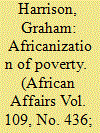

|
|
|
|
|
| Publication |
2010.
|
| Summary/Abstract |
This article explores the ways in which the British campaign coalition Make Poverty History represented Africa throughout 2005. Focusing particularly on the G8 Gleneagles summit, Make Poverty History (MPH) asserted a series of justice claims which had no geographical reference. Nevertheless, as a result of internal tensions within the coalition, and especially as a result of the ways in which MPH interacted with other political agencies as the summit approached, MPH's messages became increasingly interpolated by references to Africa as a result of the emergence of government, media, and celebrity involvement. The result of this was that global poverty increasingly became an African issue. As 2005 became the 'Year of Africa', the justice messages that constituted MPH were largely effaced by the more familiar imperial legacy which represents Africa as a place of indigence in need of outside assistance.
|
|
|
|
|
|
|
|
|
|
|
|
|
|
|
|
| 2 |
ID:
098091
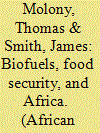

|
|
|
| 3 |
ID:
098082
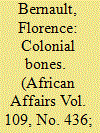

|
|
|
|
|
| Publication |
2010.
|
| Summary/Abstract |
The Franco-Congolese agreement to enshrine the corpse of Pierre Savorgnan de Brazza in a grand memorial tomb in Brazzaville (2006) has been decried by many observers as neo-colonial farce. This article interprets France's agenda to propose a 'suave reconquest' of its former colonies, and Sassou Nguesso's forceful mobilization of national and regional support. Beyond the immediate political significance of the episode, however, the article proposes new ideas on the ways in which modern states, North and South, depend on 'tournaments of value' that assign polarized worth to persons, and often back up international deals with transactions in sanctified human remains. The tactic, forged in part during the colonial era, illuminates important aspects of today's global imaginaries of domination. Brazza's bones work, in France and Africa, as a carnal fetish that, borrowing form various philosophies of power, merges Western and African beliefs in the body politic.
|
|
|
|
|
|
|
|
|
|
|
|
|
|
|
|
| 4 |
ID:
098089


|
|
|
|
|
| Publication |
2010.
|
| Summary/Abstract |
The article analyses the impact of international justice on the debate about public memory and visions of reconciliation in Namibia. Focusing on a recent submission to the International Criminal Court, it shows how domestic actors used international justice to advance their claims for reconciliation and it thus challenges the common assumption that reconciliation is an entirely domestic process. The article discusses how the ICC submission individualized guilt for past human rights abuses and neglected structures of suspicion and denunciation within the guerrilla movement SWAPO. The submission also challenged once more the government's efforts to reduce the complex history of the country's anti-colonial war to a narrative of a unified struggle, and showed that the official policy of active forgetting was still questioned after almost two decades of imposed silence.
|
|
|
|
|
|
|
|
|
|
|
|
|
|
|
|
| 5 |
ID:
098086
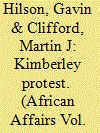

|
|
|
|
|
| Publication |
2010.
|
| Summary/Abstract |
The temporary suspension of diamond exports in Ghana in 2006 and 2007 is arguably the most significant move to address mounting criticisms of the Kimberley Process Certification Scheme (KPCS), an international initiative aimed at stemming the flow of rough diamonds used to finance wars. The ban, which took effect in November 2006, was much praised, particularly in civil society circles, where it continues to be seen as a genuine effort to prevent the smuggling of 'conflict diamonds'. At the time, Ghana was accused of harbouring stones originating from rebel-held territories in neighbouring Côte d'Ivoire. No evidence was found in support of the case that it was a repository for 'conflict diamonds', however, and exports resumed early in March 2007. This article examines the context for the accusations of Ghana's implication in the smuggling of illicit diamonds, and draws on recent fieldwork to explain how the suspension has affected Akwatia, the country's main diamondiferous area. The actions taken raise important questions about how suspected violators - particularly smaller diamond-producing nations - of the KPCS should be handled, and underscore how global compacts can have a host of negative repercussions at the village level.
|
|
|
|
|
|
|
|
|
|
|
|
|
|
|
|
| 6 |
ID:
098088
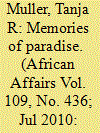

|
|
|
|
|
| Publication |
2010.
|
| Summary/Abstract |
During the Cold War, state-led education exchange programmes between post-colonial states and the former German Democratic Republic (GDR) were common. The biggest such project, the School of Friendship (SdF), sent 899 Mozambican children for socialist-inspired schooling in the GDR. By the time they returned to Mozambique in 1988, the transition from socialist-revolutionary state to capitalist society was under way. This article discusses the legacies of socialist education, focusing on the lives of some of those who spent the decisive years of adolescence in the GDR. The narratives give insights into the contradictory social reality of this historical period, showing how the SdF equipped the participants with 'modern' virtues that became vital for their future lives, but which had also become largely obsolete by the time they returned to Mozambique. The SdF could thus be judged as a highly politicized programme where children were treated as pawns in a wider political game, while at the same time new horizons opened for its participants.
|
|
|
|
|
|
|
|
|
|
|
|
|
|
|
|
| 7 |
ID:
098084
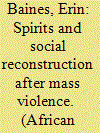

|
|
|
|
|
| Publication |
2010.
|
| Summary/Abstract |
A vibrant debate in the field of transitional justice concerns the relative ability of global, national, and local mechanisms to promote justice after violent conflict. Discussion largely focuses on more formal mechanisms of justice (courts, tribunals, or truth commissions), implying that state institutions and the law are solely responsible for shaping the process of social healing. This article suggests that scholars should take seriously more informal, socio-cultural processes outside the purview of the state, particularly for how they promote social reconstruction at the micro level. Examining the phenomena of spirit possession and ritual cleansing in northern Uganda, I illustrate how such efforts are expressions of injustice and reflect ordinary people's attempts to seek moral renewal and social repair. This approach is particularly illustrative in cases where 'intimate enemies' exist - that is, settings where ordinary people who engaged in violence against one another must live together again.
|
|
|
|
|
|
|
|
|
|
|
|
|
|
|
|
|
|
|
|
|